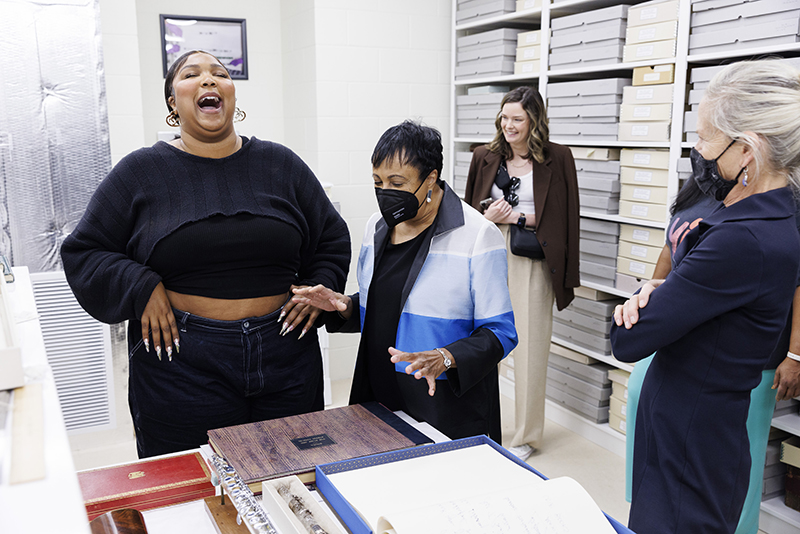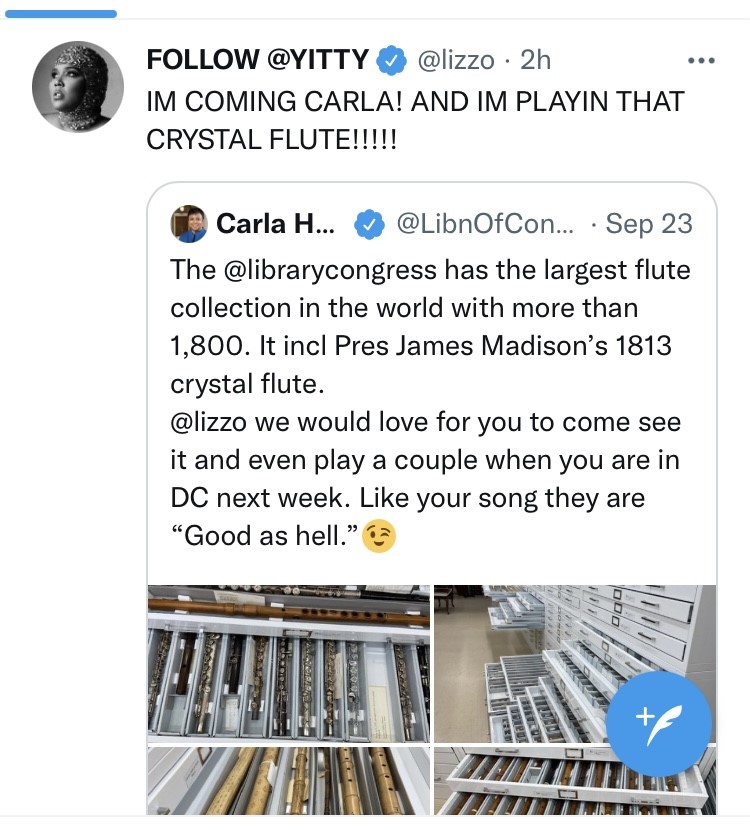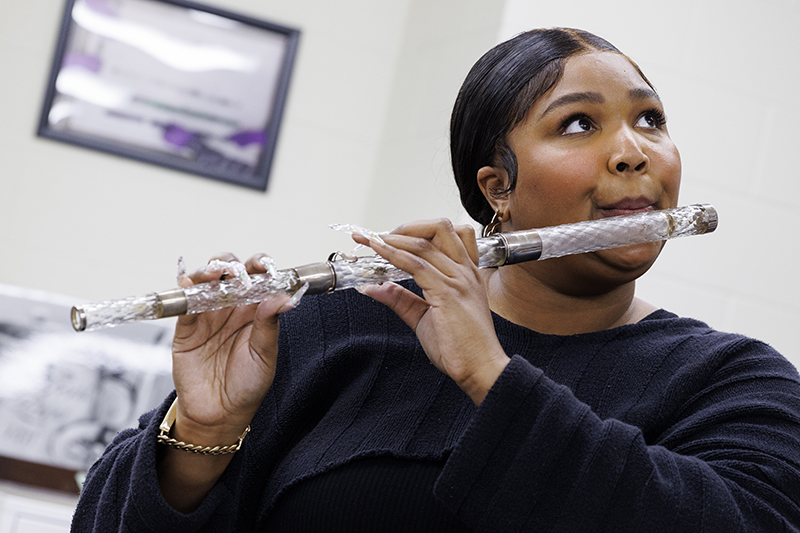
Find more great Horn Book content at these links:
Recommended books: reviews and themed booklists
App and e-book reviews
Movie reviews
Event news and recaps
Events calendar
Five Questions for Lizzo's Library of Congress Hosts
In addition to being a GRAMMY, NAACP Image Award, and MTV Award-winning songwriter and recording artist, Lizzo trained as a classical flutist...
In addition to being a GRAMMY, NAACP Image Award, and MTV Award-winning songwriter and recording artist, Lizzo trained as a classical flutist. Since she hit the global music scene, her fans have been treated to flute cameos during Lizzo shows and occasional flute-related entertainment on her social feeds. Her visit to the Library of Congress last month and subsequent playing of President James Madison's 209-year-old crystal flute during her concert at the Capital One Arena in Washington, DC, on September 27 — and the buzz they have generated around the world — are the perfect combination of an influencer using their celebrity and personal interests to show literally millions of people how awesome our national library is (and by default, libraries, archives, and museums everywhere). Lizzo affirmed for the world that “history is freaking cool” and that libraries (and archives and museums) are for everyone, underscoring one of Dr. Carla Hayden’s main goals during her tenure as Librarian of Congress, to “throw open the treasure chest.” Library of Congress staffers are now randomly being queried about their Dayton C. Miller Flute Collection at metro stations (no joke).

Lizzo with Librarian of Congress Carla Hayden in the Library’s flute vault. Photo: Library of Congress/Shawn Miller.
The Horn Book sat down (via Zoom) with two of Dr. Carla Hayden’s rockstar staff members who came up with the idea to have Lizzo visit and then made it happen. Solomon “Solo” HaileSelassie, who is the Library of Congress’s production manager, had the original idea to invite Lizzo to visit the Library in advance of her DC performance in September 2019. He worked with Roswell Encina.
1. What does your division of the LOC do?
 Solomon "Solo" HaileSelassie (left): The Music Division, which is really the Performing Arts Division, houses and collects performing arts archives and materials, from flutes to folios and manuscripts and some recordings. In an effort to make sure that collection items are as available as possible, in their performance nature, the Music Division also hosts a series of live concerts, as we’ve done since 1925.
Solomon "Solo" HaileSelassie (left): The Music Division, which is really the Performing Arts Division, houses and collects performing arts archives and materials, from flutes to folios and manuscripts and some recordings. In an effort to make sure that collection items are as available as possible, in their performance nature, the Music Division also hosts a series of live concerts, as we’ve done since 1925.
 Roswell Encina (right): As the chief communications officer, which the Office of Communications and Multimedia team is under, our job is to accomplish the Library’s mission and vision of connecting all Americans to the Library. This means trying to make sure they’re aware of the collection items at the Library, not only here in Washington — coming here physically, but also for them to know that the collections are available to them from coast to coast. The big thing is raising awareness of the collection, especially these items that the public is unfamiliar with that the Library has. People always know that we have historical items, but they may not know we have instruments or comic books. These items are there for them.
Roswell Encina (right): As the chief communications officer, which the Office of Communications and Multimedia team is under, our job is to accomplish the Library’s mission and vision of connecting all Americans to the Library. This means trying to make sure they’re aware of the collection items at the Library, not only here in Washington — coming here physically, but also for them to know that the collections are available to them from coast to coast. The big thing is raising awareness of the collection, especially these items that the public is unfamiliar with that the Library has. People always know that we have historical items, but they may not know we have instruments or comic books. These items are there for them.
2. Whose idea was it to reach out to Lizzo about the flute collection?
RE: Solomon from the Music Division. This started three years ago when Lizzo was big, but not as big as she is now as a popular performing artist. She had a concert at The Anthem here in Washington. We decided to contact her publicist and invite her to come see the flute collection, and we had Dr. Hayden tweet the invitation. Back then we didn’t get a bite. When we got wind Lizzo was coming back to Washington [in 2022] we used the same playbook. We were lucky this time and I think we upped it a bit. It became about more than just a tour. We promised her a visit to the flute vault and collection, plus a chance to see other items from the Music Division. The cherry on top was that we offered her the chance to select a flute from the collection to play at her concert.
SH: That’s basically the story. Oftentimes, when we host show-and-tells and tours like this with talent of that caliber it leads to an excitement level that we don’t really think is going to happen. When Lizzo was here we said, “Do you want to try a few flutes?” Because they’re collection items that are supposed to be used, we let her know that if she found a flute that really appealed to her — and we were able to do so — we might let her play it at her concert at the Capital One Arena. She took us up on it and she picked the crystal flute, which was kind of surprising and wonderful.
As she was going through the collection she played several, including the piccolo on which Sousa’s march “The Stars and Stripes Forever” (with the famous piccolo solo) was premiered. She played the walking stick flute and the plexiglass flute from the 1930s. The crystal flute was a bit heavier and harder to play, but she found her way into it. This is an experience that we offer to string players at least once a year for the Stradivari Anniversary Concert. They get to try out our historic stringed instruments and select one to play in a concert. We do this all the time — having musicians and visitors interact with our treasures.
3. How did her visit — and that concert footage! — come to pass?
RE: This is our big starry moment here. The original invite went out two weeks ahead of the visit. We followed up with a tweet invitation closer to the concert date. It got a lot of likes and retweets, including from some verified accounts, which helped. When we woke up on Saturday, September 24, we saw the big retweet from Lizzo saying “IM COMING CARLA! AND IM PLAYIN THAT CRYSTAL FLUTE!”
Over the weekend we ironed out the plans for the visit with her team. She decided to come on her off day, Monday (September 26), for the visit. We feel very honored that she and her team decided to spend her off day visiting us. We offered an abbreviated visit and her team agreed to that, but as often happens the excitement leads visitors to stay much longer. Lizzo stayed for over three hours! Dr. Hayden greeted Lizzo, her mom, her sister, her staff, and members of her band. Folks from the Music Division really did their homework and were able to pull items that would resonate with Lizzo.

SH: We had on display lyric sheets from the Oscar Hammerstein II Collection, because Lizzo’s a lyricist. We brought out the original lyric sheets for “My Favorite Things” (from The Sound of Music). We had some scores of John Williams. She had mentioned in some interviews that he was one of her favorite composers. When she looked at the scores she mentioned she would love to be conducted by John Williams. We also brought out a really interesting letter from Anita Baker to her producer with lyric sketches for one of her famous songs. It was a very cool moment for Lizzo to see how creatives in her arena deal with evolving their craft and making their art. We showed her a Beethoven manuscript with smudges where he was erasing the notes. Lyric sheets with changed or new lyrics. She realized how much similar work she does on her own, encouraging her to save those materials so in the future people can do a bit of research on Lizzo.
RE: There were additional music manuscripts that relate to classical flute repertoire (e.g., Poulenc) that would resonate with her given her musical background. The flute curator and Dr. Hayden were impressed because it was clear that Lizzo really knows her stuff. We know her as a very popular artist, but she is definitely a classically trained flutist, too. There were a lot of ooo’s, and ahh’s, and screaming.
Bonus Question: What was the one item that got the biggest reaction?
SH: The crystal flute and the Beethoven manuscript.

Lizzo visits the Library of Congress flute vault, Monday, September 26, 2022. Photo: Library of Congress/Shawn Miller.
4: “History is freaking cool, guys!” Why is that quote, coming from a cultural icon, so important?
RE: Somebody with a status like Lizzo empowers kids, whether you’re learning how to play the flute, you’re in band camp, or maybe you’re being bullied for playing an instrument. This empowers them and says they’re cool. There’s somebody like Lizzo out there, who’s one of the most popular artists in the world, showing that playing an instrument like the flute is something spectacular and fabulous. She has a great appreciation of history and its importance for kids. The history and story of this country adds another level. That excitement coming from her makes kids understand the value of the work that is done at the Library of Congress and libraries, archives, and museums around the world. Like Dr. Hayden usually says, we’re not a mausoleum for these items. They need to be seen. They need to be played, hence why the Strads are played once a year. Smokey Robinson and Lionel Ritchie have played George Gershwin’s piano. We want to make sure people are aware these items are for them. With Lizzo’s help, we were able to elevate all that.
SH: It also reinforces something that we’ve spent a lot of time as an institution to put out there. We remind the general public that history and historical objects are open to them — cool and available to them.
5. What has been most notable to you so far about Dr. Hayden's term as Librarian of Congress?
RE: Trying to connect these collection items in different ways to different audiences, whether it’s Lizzo, Gloria and Emilio Estefan (past Gershwin prize awardees), or our films on the lawn. Opening up the library, thinking outside the box. It’s been a change of culture of how to look at these collection items and how to share them with the public. From the Gloria Gaynor concert (in May 2017) to the cast of Queer Eye visiting, these were things the Library of Congress would not have even considered doing six years ago. We’re opening it up to a whole new audience.
SH: Watching how excited Dr. Hayden gets when people interact with the collection. When Garth Brooks is looking at his Copyright deposits and she is as excited as he is. That people are engaging with the collection in a way that is meaningful and useful to them. When Lizzo went into the Main Reading Room and wanted to play the flute in there Dr. Hayden went around and asked every researcher who was using the space if they were okay with the music. An appreciation for the users of the Library and how everything is driven by that desire to serve the people.

RELATED
ALREADY A SUBSCRIBER? LOG IN
We are currently offering this content for free. Sign up now to activate your personal profile, where you can save articles for future viewing.







Add Comment :-
Be the first reader to comment.
Comment Policy:
Comment should not be empty !!!